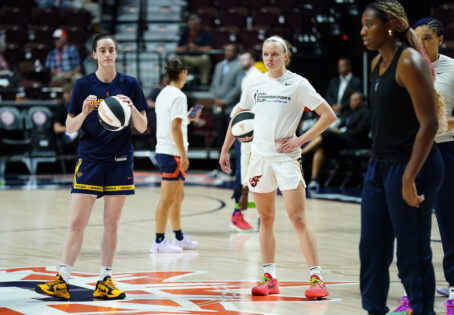

The Indiana Fever and their star rookie, Caitlin Clark, are navigating a challenging introduction to the WNBA, marked by perceived officiating disparities and a growing sense of disrespect. The latest wave of discontent follows a controversial finish against the New York Liberty on May 24, 2025, where a no-call on a play involving Clark sparked outrage.
Fever head coach Stephanie White didn't mince words, lambasting WNBA referees for what she deemed "egregious" officiating. "I thought she got fouled. I think it's pretty egregious what's been happening to us the last few games," White said, referring to the non-call when New York's Natasha Cloud made contact with Clark during the game's final possession. "The disrespect right now for our team has been pretty unbelievable. So, it's disappointing, you know, that it doesn't go both ways, or it hasn't gone both ways."
White also questioned the effectiveness of the league's system for addressing officiating concerns. "There's a system to making sure that we can send stuff in and communicate our grievances, so to speak. I don't know if I have a feeling that the system works," she stated.
The specific play in question showed Cloud making shoulder contact with Clark as the ball came loose. Clark immediately reacted, expressing her frustration to the officials, with teammate Sophie Cunningham also protesting the lack of a whistle. The Fever ultimately lost the game 90-88, adding to a series of close contests where officiating has been a central talking point.
Adding fuel to the fire, statistics highlight a significant free throw disparity in several Fever games. In the Liberty game, New York had 32 free throw attempts compared to Indiana's 15. Similarly, in a previous game against the Atlanta Dream, Atlanta had 23 attempts to the Fever's 15. This pattern has led to accusations that the Fever are not receiving the same officiating consideration as their opponents.
While Clark herself has mostly refrained from directly criticizing the officiating, her on-court frustration has been palpable.
The situation has ignited a broader debate about the treatment of Clark and the Fever within the WNBA. Some observers suggest that Clark's rising stardom and the increased attention she brings to the league have inadvertently made her a target, with other players and teams perhaps motivated to assert their dominance against the perceived newcomer. Others point to a more systemic issue with WNBA officiating, arguing that inconsistencies and missed calls are a league-wide problem.
The debate extends beyond individual games and calls into questions the league's approach to protecting its star players and ensuring fair competition. While it may be unrealistic to suggest that the WNBA or its referees would specifically target the Fever or Clark, the perception of bias and the statistical disparities are difficult to ignore.
The WNBA faces the challenge of addressing these concerns, not only to ensure fairness for the Indiana Fever and Caitlin Clark but also to maintain the integrity and credibility of the league as a whole. As viewership continues to rise and interest in women's basketball reaches new heights, the league must demonstrate a commitment to consistent and impartial officiating to avoid alienating fans and undermining the sport's growth.